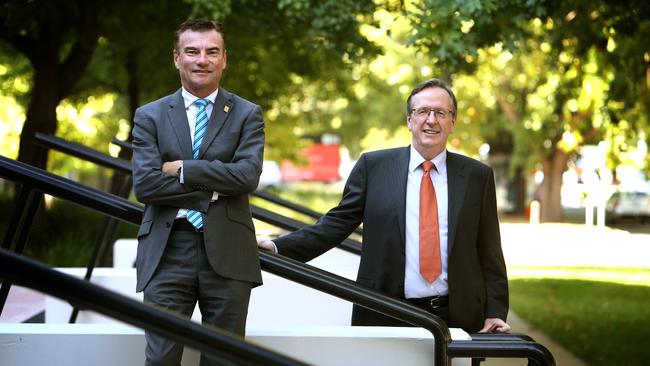Workers face a brave new world
The job market is changing quickly and people and organisations must catch up.

There is no such thing as a job for life and careers as we know them also may be obsolete, according to a Deloitte Access Economics report released this week.
The future of work report — Future Inc — was commissioned by Chartered Accountants Australia New Zealand and is aimed at challenging early term professionals, employers, policymakers and schools to consider how technology and other factors will affect the workplace.
The report outlines four emerging employment industry mega trends — increasing globalisation, digital disruption, the ageing population, and changing consumer demands — and how organisations need to adapt to survive.
CAANZ chief executive Lee White says there is genuine excitement about the extent of change on the horizon, but there is also trepidation.
“What we’re trying to do here under the banner of Future Inc is, importantly, to start the right conversations about the prosperity of this country,” White says.
White says the report challenges several perceptions, including the theory that younger people are job jumping every two or three years.
The report finds average tenure is not decreasing and is holding steady at seven years.
Lee says employers see younger workers job jumping as a sign of them being willing to multiskill rather than being unstable, failing to commit or endlessly seeking to move up the ladder.
More than 1400 Australian workers were surveyed to gauge their views for the paper, with 39 per cent concerned about their future careers and more than 60 per cent of early career professionals believing their jobs are unlikely to exist in 15 years.
Changing technologies are having an impact on the workforce, and whether this is making people and positions obsolete, or increasing access to overseas markets, workers will be affected.
With access to international freelance markets and cheaper labour in some Southeast Asian countries, Australian workers are facing increased competition.
But it also means they can throw their hat in the ring and tender for jobs in cities on the other side of the world.
The study found Australian workers increasingly will need to compete against talent from other countries, while allowing local companies to access a larger pool of global talent, putting downward pressure on wages.
It will be tougher to find contract work in some industries, but with foresight and ingenuity workers will find it easier to access international work if they are prepared to look.
They will need to become “virtual global workers”.
There are also expectations that many jobs won’t exist in little more than a decade, with the workplace changing so rapidly educators are struggling to keep up.
Holly Ransom, who co-chaired the 2014 G20 Youth Summit, says young workers increasingly are creating portfolio careers instead of specialising in one role, to ensure they are at least employed.
Ransom says the report found that 60 per cent of the roles young Australians are training in will be replaced by automation within a decade, meaning those skills will be irrelevant.
She says educators need to move towards teaching transferable and enterprising skills, but they are failing to keep up. “This generation is going to have to be enterprising, their careers will play out in a different degree and a different way to previous generations,” Ransom says.
“They’re going to have multiple careers, they’re potentially going to have portfolio careers, so that at any one point in time their income is not coming from a single source job, they’re taking two days a week here and a contract over there, they’re piecing it together in a portfolio to be able to earn enough income.”
With jobs being replaced by automation and evolving IT systems, the report outlines several positives, including data showing the federal government will save $18 billion if digitisation is fully harnessed and departments streamline service delivery.
Deloitte recently calculated that more effective online service delivery and digitisation would result in more than 50,000 public sector job losses, including keyboard operators, mail sorters and inquiry clerks.
While streamlining service delivery may help the government’s bottom line, redundant workers will be forced to retrain or change careers, and they must have suitable foundation learning skills to ensure they can move with the changes.
But Deloitte partner and co-author Ric Simes says while there is always pessimism around job losses in dying professions, jobs will be created in new industries and many of those will be related to information technology careers.
“It is much easier to highlight the destruction and much harder to see the creation,” Simes says.
He says it is becoming hard to adapt to mass job losses, such as car manufacturing in Victoria and South Australia, and useful retraining will be critical.
To ensure workers are not left without career prospects, the report says more employees will need to undertake further study including online courses, or reskilling at their present worksite.
Retraining should include literacy and numeracy training for workers in manufacturing and other threatened industries, along with discussions about future careers in the growing service, health, technology and hospitality industries.
Simes says taking older workers into account is also critical.
Despite the government encouraging baby boomers to work beyond their mid-60s, older workers battle ageism in many professions. The report finds 50 per cent of workers experience age discrimination in organisations and when looking for new roles.
Simes found that a 5 per cent increase in workers aged over 55 would result in a $48bn annual boost to the nation’s gross domestic product.
Verity Edwards travelled to the Canberra launch of Future Inc as a guest of CAANZ.


